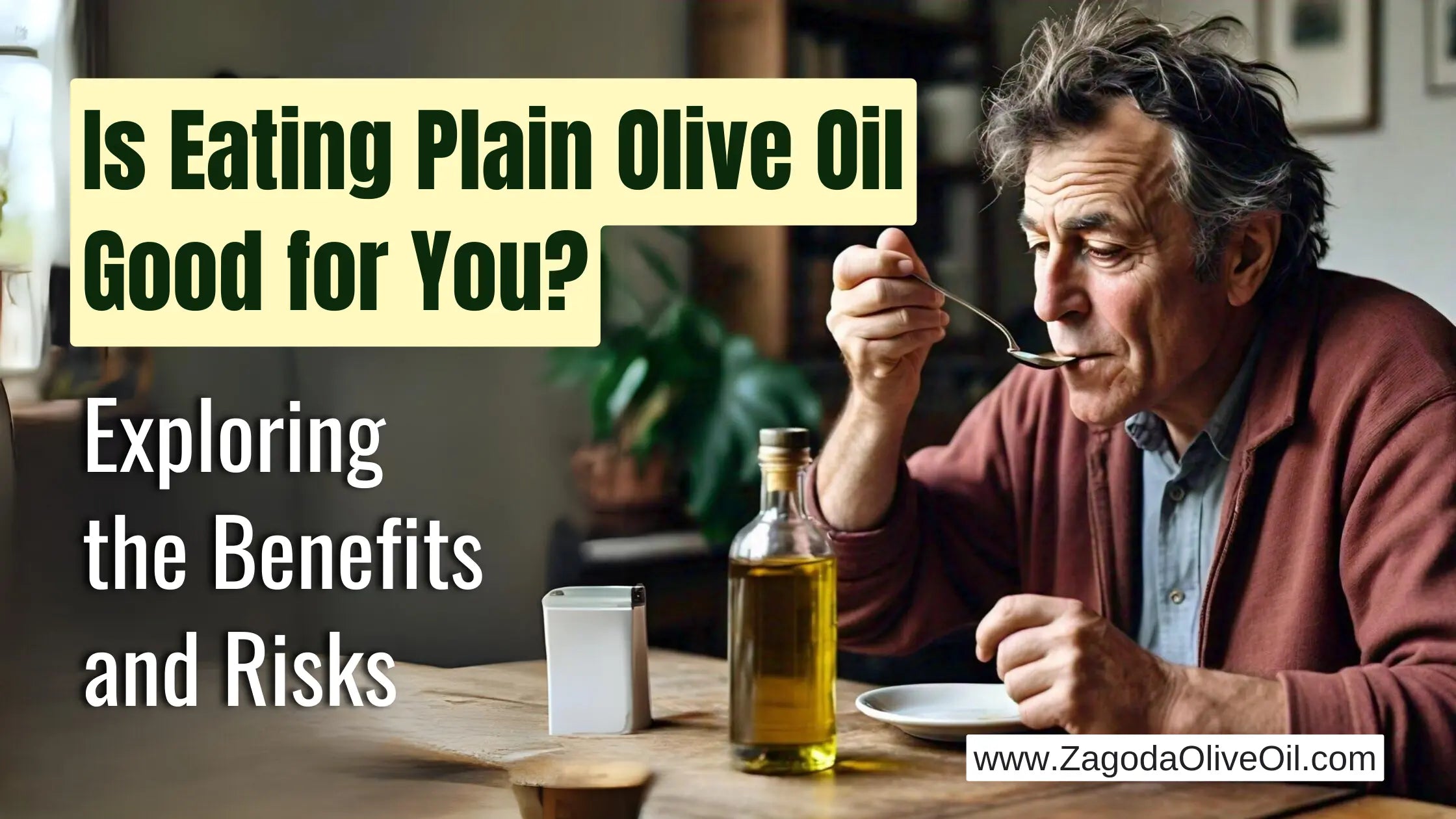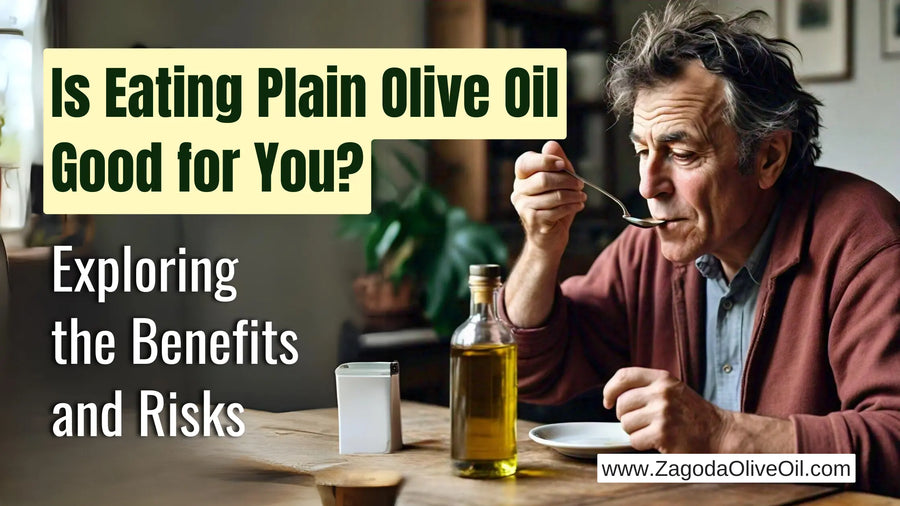Is eating plain olive oil beneficial to your health? This question explores the core of Mediterranean diets and lifestyle practices around the globe. Extra virgin olive oil has long been praised for its high concentration of antioxidants, good fats, and anti-inflammatory qualities.
When consumed unfiltered olive oil provides numerous health advantages, ranging from enhancing cardiovascular well-being to augmenting skin radiance.
This article will discuss the benefits and risks of eating olive oil daily. Enhance your health with each drop of pure olive oil. Click this link and buy our olive oil.
How to Eat Your Diet with Raw Olive Oil?
It can be delicious for your health to include raw olive oil in your diet. Salad dressing is one of the easiest methods to accomplish this. Fresh greens, tomatoes, cucumbers, and other vegetables taste better when drizzled with extra virgin olive oil, which also supplies a good amount of heart-healthy monounsaturated fats.
To make a more elegant dressing, you may also combine it with lemon juice, balsamic vinegar, or a tiny touch of Dijon mustard. Adding it as a last-minute garnish to foods like spaghetti, seafood, or grilled veggies is another simple way to use it. Just before serving, toss in a little extra virgin olive oil to enhance the flavor and retain some of its nutrients.
You can include raw olive oil in your diet through spreads and dips, along with salads and major courses. A common use is to combine it with spices and herbs to make a bread dip that is healthier than butter or margarine.
To improve the creaminess and nutritional profile of hummus and other bean dips, you may also incorporate olive oil into the mixture. For an added nutritional boost, try adding a little olive oil to your smoothies or spreading it over avocado toast for the morning.
Explore the Nutritional Values of eating olive oil
The following are some important details regarding raw olive oil's nutritional value:
Enriched with Monounsaturated Fats:
The main lipid found in raw olive oil is oleic acid, a type of monounsaturated fat that has been shown to lower inflammation and promote heart health.
Rich in Antioxidants:
Rich in antioxidants that shield cells from oxidative damage and may reduce the risk of chronic diseases, such as polyphenols, vitamin E, and carotenoids.
Anti-Inflammatory Properties:
The anti-inflammatory properties of raw olive oil, derived from oleic acid and polyphenols, can help lower the risk of chronic inflammation-related disorders including arthritis.
Benefits for Heart Health:
Eating raw olive oil can raise good cholesterol levels and lower bad cholesterol levels by consuming more HDL (good) cholesterol and less LDL (bad). This helps support heart health.
Absorption of Nutrients:
The good fats in raw olive oil facilitate the assimilation of fat-soluble vitamins (A, D, E, and K) as well as other healthful substances from diets.
Potential Cancer-Preventive Properties:
Studies have indicated that olive oil's antioxidants and good fats may offer some protection against breast cancer in particular.
Brain Health:
Raw olive oil's antioxidants and monounsaturated fats may help maintain brain health and guard against neurodegenerative illnesses and cognitive loss.
Weight management:
The good fats in raw olive oil, despite their high-calorie content, can help with satiety, appetite control, and weight management.
Skin Health:
Raw olive oil's antioxidants, including vitamin E, improve the skin's suppleness and moisture content while fending off premature aging.
Digestive Health:
Olive oil can help to promote good digestion and lower the risk of constipation by having a modest laxative action.
Raw Olive Oil vs. Cooked: Which Is Better?
The conversation over whether raw or cooked olive oil is better for you usually revolves around how much of its flavor and nutrients are retained. Because it is not heated, raw olive oil—especially extra virgin olive oil retains all of its natural antioxidants, polyphenols, and vitamins.
Numerous health advantages of it, including its ability to reduce inflammation, lessen the risk of chronic diseases, and support heart health, are attributed to these components. Its strong, fruity flavor, which can improve the flavor of foods like salads, drizzled veggies, and bread dips, is also best enjoyed in its raw state.
However, heat can destroy some of the delicate chemicals in olive oil, even though cooking with it is widespread and still has health advantages. Olive oil can create hazardous chemicals and lose some of its antioxidant qualities when heated over its smoke point.
Cooking with olive oil can still improve the flavor of cooked food and supply beneficial monounsaturated fats. In the end, you may take advantage of olive oil's health advantages and culinary diversity in a variety of ways by including both raw and cooked forms into your diet.
Benefits of drinking olive oil
Olive oil has a high content of antioxidants and healthy monosaturated fats that may have health benefits. It has anti-inflammatory qualities as well.
There is controversy concerning dietary fat's effects on health.
A Good Source of Monounsaturated Fats Is Olive Oil
The natural oil derived from olives, which are the fruit of the olive tree, is called olive oil. Saturated fat makes up about 14% of the oil, while polyunsaturated fats like omega-6 and omega-3 fatty acids make up 11%. However, with 73% of the total oil content, oleic acid, a monounsaturated fat, is the main fatty acid found in olive oil.
High Levels of Antioxidants in Olive Oil
Extra virgin olive oil is not too bad for you. Furthermore, to its healthy fats, it has trace levels of vitamins K and E. However, olive oil also contains a wealth of potent antioxidants. These biologically active antioxidants have the potential to lower your risk of developing chronic illnesses. Also, they help prevent oxidation of blood cholesterol and fight inflammation, two factors that may reduce your risk of heart disease.
Strong Anti-Inflammatory Effects of Olive Oil
It is believed that metabolic syndrome, type 2 diabetes, cancer, heart disease, Alzheimer's, arthritis, and even obesity are all largely caused by chronic inflammation. One of extra-virgin olive oil's primary health benefits may be its ability to alleviate inflammation.
The antioxidants mediate the majority of the anti-inflammatory actions. The most important of these is oleocanthal, an anti-inflammatory medication that has been demonstrated to function similarly to ibuprofen.
According to some experts, the oleocanthal in 3.4 tablespoons (50 ml) of extra virgin olive oil has an impact that is comparable to 10% of an adult's ibuprofen intake.
Conclusion
In the end, in this article, we give you detailed information about the olive oil benefits.
By consuming raw olive oil—especially extra virgin olive oil—you can maintain its high concentration of heart-healthy lipids, antioxidants, and vitamins, all of which can enhance general wellbeing and reduce inflammation. Including raw olive oil in your diet can improve the taste and nutritional value of your meals.
It can be added to prepared dishes after they have finished cooking or drizzled over salads. As with any dietary decision, moderation is essential, but adding raw olive oil can be an easy and tasty method to encourage leading a better lifestyle.


